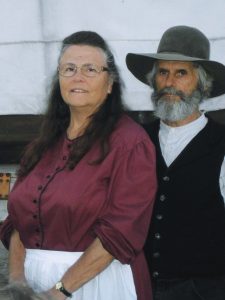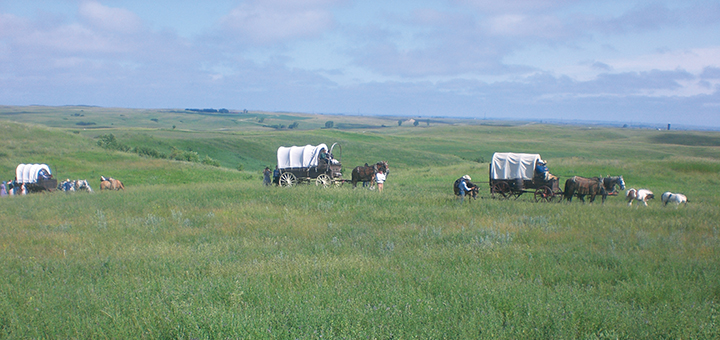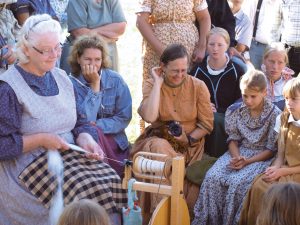For the past 20 years Roger and Lorraine Foerderer and their extended family have been hosting an annual wagon train adventure on the prairie surrounding their Triple F Ranch in Medina, North Dakota. Upwards of 70 guests join the family (including their four adult children and spouses and 18 grandchildren) for three and a half days of traveling back in time on a trail that varies yearly from 10-12 miles in length.

Roger and Lorraine Foerderer host an annual wagon train trip on the prarie surrounding their North Dakota ranch.
Guests learn about pioneer life first hand by riding in canvas-topped box wagons like those used in the 1840s, or traveling alongside on horseback or foot during the trip. Everyone dresses in period clothing, including bonnets and aprons for the ladies and girls and vests, suspenders and western hats for the men and boys.
“It’s a chance to leave the modern world behind for a few days and enjoy the simple pleasures of tent camping and eating meals cooked over an open fire,” says Theresa Sund, Roger and Lorraine’s daughter. She and her husband, Steve, and their five children look forward to the event all year. “The natural setting under the wide open sky provides a great opportunity for Christian fellowship and fun and discovering more about our western heritage,” adds Theresa.
Wendy Cook, who has participated in the wagon train three times so far, had this to say:
You get a feel for what the people who helped settle our country went through. It was hard and dangerous. Going on the wagon train gives you the chance to experience a bit of what they felt, but in a safe and Christian environment.
I believe I have been on on it three times so far and am hoping to go again this year. The best reason to go on it is, well, just to be around the Sunds and Foerderers. They are the most amazing people I have ever met! Honestly.
But why would someone who does not know them want to go? The most compelling reason to attend the wagon train is that you get a feel for what the people who helped settle our country went through. The first year I went, it was hot! Then here would come the rain. We were wet. Then the sun would come out and the heat and humidity and mosquitos returned with a vengeance. It was uncomfortable–miserable even.
But I realized I wouldn’t have it any other way. I began to understand that the folks who took their families across the country to settle in unknown places had it hard. It was not some charming little family vacation. It was real. It was hard. It was dangerous. But they did it anyway. There was no going home if they didn’t like what was happening. They were committed.
Would we give up our homes and risk the very lives of our family members to do the same? Going on the wagon train gives you the chance to experience a bit of what they felt, but in a safe and Christian environment. It helps you to understand what it cost to have the freedoms and liberties we now enjoy. It helps you appreciate the comforts we take for granted and to appreciate what you have. It is especially good for families with children to learn those very lessons.
One of my favorite memories was when I actually got to be “behind” the scenes, as the “potty lady,” pulling the porta-potties to the next designated location. Never did I feel so appreciated or welcomed as when I pulled in and a crowd awaited me. Talk about feeling important!
Also, the music around the campfire every night is awesome. I deeply enjoy the Christian bluegrass style singing and playing.
Fun and Games
Through the years, activities during the trip have included churning, rug making, soap and candle making, wool felting, fire starting using flint and steel, hatchet throwing, roping and buck sawing. Games always begin with good old-fashioned three-legged races, sack hops and tug-of-war.
“Every year is a little different,” Theresa notes. “But there is always an abundance of singing around the campfire.” Everyone is encouraged to bring their instruments and join in the music each evening.
Hearty, Healthy Chow
The chuck wagon provides three delicious daily meals and is always a gathering place for young and old. During the second evening on the trail the older Foerderer grandkids bring in fresh supplies on horseback (simulating the assistance of the Cavalry). The healthful, vegetarian menus often prompt guests to comment at the end of the trip about how good they feel.
The wagon train is community oriented—all members of a “wagon family” participate in the daily chores needed to survive on the trail, including cooking and serving food, carrying water, and hauling and chopping firewood. Everyone helps, from the oldest, which was once age 90, to the youngest children.
Relaxation
No electronic devices of any type are permitted on the trip. Only the wagon master carries a cell phone for emergency use. Theresa describes the days as peaceful and relaxing. “Being in nature calms the spirit. The children pick lots of prairie flowers and decorate the wagons.”
Relationships
Christian fellowship is a main highlight of the wagon train event. Attendees from all religious persuasions enjoy the morning devotional thoughts and prayer time, often led by the Foerderer’s son who comes each year with his family from their home in Montana. Many people make it their annual family vacation and develop strong friendships through the years. The Foerderers report that every year they receive stacks of Christmas cards from people as far away as Tennessee and Canada saying how much they loved the wagon train and that it was one of their best family experiences ever.
When Steve and Theresa’s oldest daughter married last summer, 35 of their Amish friends who have been on the wagon train traveled from Indiana to attend the wedding. “It was very meaningful to us that they would come so far to join our family celebration,” says Theresa, who has visited the Amish community several times. “Building relationships is what the wagon train experience is all about.”











